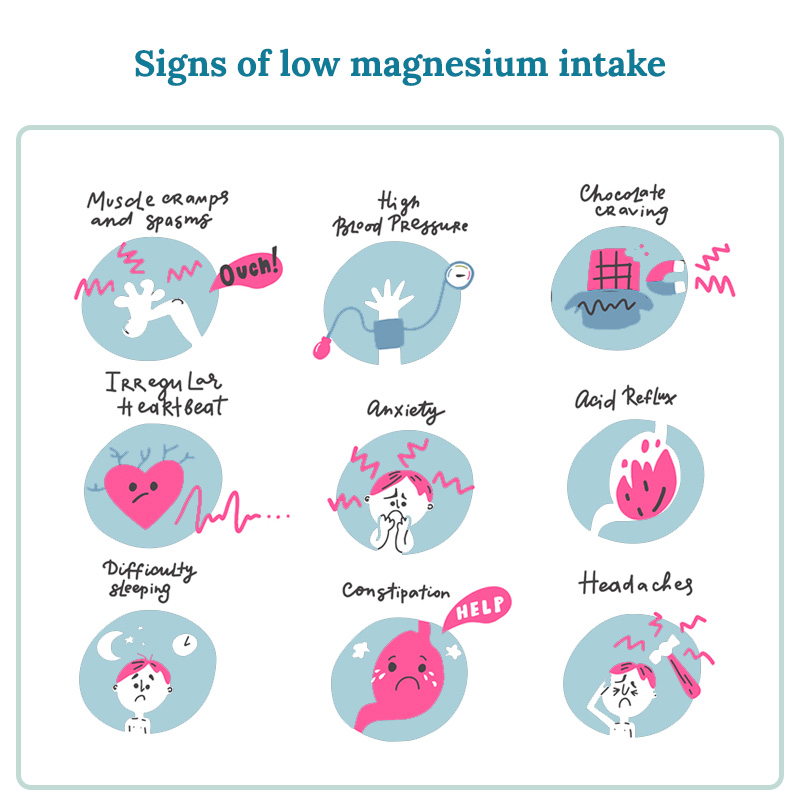Reviewed by Dr. Sarika Arora, MD
Magnesium is an essential nutrient, involved with over 300 cellular processes in the body – from energy production, blood sugar metabolism, muscle function and stress response regulation to cardiovascular, hormonal, bone and neurological health.

Despite our great need for magnesium, many women don’t meet the recommended daily intake for the mineral. Magnesium deficiency affects as many as 50% of Americans, with women more likely than men to develop suboptimal levels.
Supplementing with magnesium is an effective way to boost intake, but there is one big problem: commonly available forms of the mineral are difficult for the body to absorb.
This is where Magnesium Glycinate comes in – and why it’s such a game changer. Magnesium Glycinate is a highly bioavailable form of magnesium, rapidly absorbed in the GI tract to quickly replenish levels of the mineral. In this bioactive form, magnesium and the natural amino acid glycine work synergistically in the body to provide an array of powerful health benefits.
Table of Contents
- What is Magnesium Glycinate?
- Benefits of Magnesium Glycinate
- Magnesium Glycinate vs. Other Forms of Magnesium
- Potential Side Effects of Magnesium Glycinate
- Magnesium Glycinate Dosage for Women
- Foods Rich in Magnesium and Supplementation
- FAQs about Magnesium Glycinate
What is Magnesium Glycinate?
Magnesium Glycinate (Mg Glycinate) is formed when magnesium is combined with glycine, a natural amino acid that helps magnesium enter cells. The body produces its own glycine and the amino acid is found in high-protein foods.
Magnesium Glycinate – chemical formula C4H8MgN2O4 – is also known as magnesium diglycinate or magnesium bisglycinate based on the compound’s organic form of one magnesium atom attached to two (bi-) glycine molecules. Magnesium Glycinate’s uniquely bioavailable structure facilitates magnesium absorption in the intestines, where the mineral is then transported and utilized throughout the body.
Thanks to this optimized absorbability, Magnesium Glycinate is much less likely to cause digestive issues (including diarrhea) associated with supplements made with magnesium oxide or magnesium citrate.
Benefits of Magnesium Glycinate
Magnesium Glycinate offers several key health benefits that are central to women’s health and wellness.
Relaxation
Magnesium is known as the “calming mineral” for its role in managing the stress response and its ability to enhance muscle relaxation and mental calm. In the body, magnesium and glycine work synergistically to supercharge these effects.
Specifically, glycine’s own calming properties complement magnesium’s role in relaxing muscles and nerves, aiding in stress reduction and overall relaxation.

Improved sleep
Magnesium enhances neurotransmitters that influence sleep, including GABA, and assists in the production of the sleep hormone melatonin. Combined with glycine’s calming properties, Magnesium Glycinate helps improve sleep quality and alleviate insomnia or restless sleep.
Healthy muscle function
Magnesium is essential for muscle function and relaxation. Supplementing with Magnesium Glycinate helps to reduce muscle cramps, spasms and tension.
Help for menopausal bone loss
Magnesium is a prime mineral for maintaining healthy bone density and minimizing bone loss. Magnesium aids in the deposition of calcium and other minerals into the bone matrix. Osteoblasts (bone-building cells) rely on magnesium to help form the crystalline structure of bone, contributing to its strength and density. During and after menopause, getting enough magnesium is associated with lowering women’s risk for osteoporosis and fracture.

Hormonal imbalance
Magnesium can play a supportive role in alleviating symptoms related to hormonal imbalance during perimenopause and menopause by providing calming relief for sleep disturbances, mood swings, anxiety and irritability. Other studies suggest that magnesium supplementation may help in balancing hormones during the menopause transition, potentially reducing symptoms like hot flashes and night sweats.
Heart health
Magnesium is beneficial for heart health. The mineral is involved in maintaining a steady heartbeat and supporting overall cardiovascular health. Supplementing with magnesium glycinate supports the mineral’s role in regulating blood pressure and reducing the risk of heart-related issues.
Mood
Magnesium supports healthy neurotransmitter function, influencing mood regulation and stable mood. Studies suggest that magnesium supplementation could help in managing symptoms of depression.
Improved Energy Levels
Magnesium is involved in energy production at the cellular level as an essential cofactor for the ATP (adenosine triphosphate) molecule, which is often referred to as the “energy currency” of the cell. Supplementing with Magnesium Glycinate helps ensure that enough of the mineral is present to combat fatigue and enhance energy levels.

Blood sugar balance
Magnesium supports healthy insulin function by helping cells respond effectively to insulin. The mineral is a key ingredient in maintaining healthy blood sugar levels: low magnesium levels have been associated with an increased risk of insulin resistance and impaired glucose tolerance, which can contribute to the development of type 2 diabetes.
PMS relief
If you experience menstrual cramps and/or mood swings and irritability in the days around your monthly period, magnesium can provide PMS symptom relief by enhancing muscle relaxation and providing neurotransmitter support for mood regulation and stability.

Magnesium Glycinate vs. Other forms of Magnesium
Magnesium glycinate is known for its enhanced bioavailability, especially when compared to magnesium oxide and magnesium citrate, two common forms of magnesium found in supplements. In one study comparing magnesium oxide and magnesium citrate with other types of magnesium formulations, oxide and citrate ranked lowest for absorbability.
Magnesium glycinate is much less likely than magnesium oxide or magnesium citrate to cause digestive issues like diarrhea or stomach discomfort. This makes it a preferred choice for individuals with sensitive stomachs or those prone to gastrointestinal disturbances.
Other forms of magnesium do sometimes offer benefits. Magnesium citrate, for example, is used to treat occasional constipation on a short-term basis. Magnesium citrate works as a saline laxative to cause water to be retained in the stool. Magnesium oxide is sometimes used as an antacid for relief of heartburn and indigestion and as a short-term laxative.
Potential Side Effects of Magnesium Glycinate
Magnesium Glycinate is generally well-tolerated by most people, but like any supplement, may potentially cause mild side effects for some individuals. Take in recommended dosage amounts. While magnesium glycinate is less likely to cause digestive problems compared to other forms of magnesium, some individuals may still experience abdominal discomfort when magnesium glycinate is taken in high doses.
Allergic reactions to magnesium are rare. If you notice signs of an allergic reaction (rash, hives, etc.) discontinue use.
Magnesium Glycinate dosage for women
Recommended daily intake/supplemental dosages of Magnesium Glycinate for women by age:
| Age | Daily Intake (Miligrams) | Pregancy | Laction |
| Birth to 6 months | 30 mg | ||
| 7 to 12 months | 75 mg | ||
| 1 to 3 years | 80 mg | ||
| 4 to 8 years | 130 mg | ||
| 9 to 13 years | 240 mg | ||
| 14 to 18 years | 360 mg | 400 | 360 |
| 19 to 30 years | 310 mg | 350 | 310 |
| 31 to 50 years | 320 mg | 360 | 320 |
| 51 + years | 320 mg |
Foods Rich in Magnesium and Mg Supplementation
The following magnesium-rich foods offer a natural way to boost magnesium intake.
- Spinach, cooked, 87 mg of magnesium per 1 cup serving
- Swiss Chard, cooked, 86 mg of magnesium per 1 cup serving
- Kale, cooked, 25 mg of magnesium per 1 cup serving
- Quinoa, cooked, 64 mg of magnesium per 1 cup serving
- Whole wheat spaghetti, cooked, 54 mg of magnesium per 1 cup serving
- Brown rice, cooked, 39 mg of magnesium per 1 cup serving
- White beans, cooked, 63 mg of magnesium per 1 cup serving
- Red kidney beans, cooked, 45 mg of magnesium per 1 cup serving
- Pumpkin seeds, 168 mg of magnesium per 1 oz serving
- Dark chocolate, 60-69% minimum cocoa, 50 mg per 1 oz serving
- Almonds, dry roasted, 80 mg per 1 oz serving
- Peanut butter, smooth, 49 mg per 2 Tbsp serving
- Cashews, dry roasted, 74 mg per 1 oz serving
- Avocado, cubed, 44 mg per 1 cup serving
Depending on your dietary needs and preferences, getting your daily magnesium intake through diet alone may not be possible. Magnesium Glycinate is a natural option for consistent magnesium supplementation.
FAQs about Magnesium Glycinate
Why take magnesium glycinate at night?
Magnesium glycinate aids in promoting better sleep quality and combating insomnia, making it a natural fit to take when you are winding down in the evening.
How does Magnesium Glycinate aid in sleep?
Magnesium glycinate helps relax muscles and nerves, potentially reducing nighttime muscle cramps or restless leg syndrome, fostering a more restful sleep. It also enhances restful neurotransmitter messages and assists with the production of melatonin.
What is Magnesium Glycinate good for?
Magnesium Glycinate provides a highly bioavailable form of magnesium and is gentler on the stomach compared to other magnesium supplements. Magnesium glycinate supports bone health, muscle function and nerve transmission while calming the nervous system, easing anxiety/irritability and improving sleep quality. Additionally, Magnesium Glycinate helps to regulate blood sugar levels and boost cellular energy production. Magnesium glycinate is valued for its versatility in promoting overall well-being.
Does magnesium help with anxiety?
Studies suggest low magnesium levels may contribute to stress-related anxiety, so supplementation can potentially alleviate symptoms of anxiousness. Magnesium helps to regulate neurotransmitters that affect mood, calming the nervous system and contributing to feelings of relaxation.
How long does magnesium stay in your body?
Magnesium typically stays in the body for up to 24 hours. Consistent daily intake of magnesium-rich foods or natural magnesium supplements can help maintain adequate levels.
National Institutes of Health Office of Dietary Supplements. Magnesium Fact Sheet for Health Professionals (http://ods.od.nih.gov/factsheets/Magnesium)
Kisters K, Spieker C, Tepel M, Zidek W. New data about the effects of oral physiological magnesium supplementation on several cardiovascular risk factors (lipids and blood pressure). Magnes Res 1993;6:355-360.
Lasserre B, Spoerri M, Moullet V, Theubet M-P. Should magnesium therapy be considered for the treatment of coronary heart disease? II. Epidemiological evidence in outpatients with and without coronary heart disease. Magnes Res 1994;7:145-153.
Orlov MV, Brodsky MA, Douban S. A review of magnesium, acute myocardial infarction and arrhythmia. J Am Coll Nutr 1994;13:127-132.
Rayssiguier Y, Durlach J, Gueux E, Rock E, Mazur A. Magnesium and aging. I. Experimental data: Importance of oxidative damage. Magnes Res 1993;6:369-378.
Rock E, Astier C, Lab C, et al. Dietary magnesium
Sojka JE, Weaver CM. Magnesium supplementation and osteoporosis. Nutr Rev 1995;53:71-74.
Spencer H, Fuller H, Norris C, Williams D. Effect of magnesium on the intestinal absorption of calcium in man. J Am Coll Nutr 1994;13:485-492.












